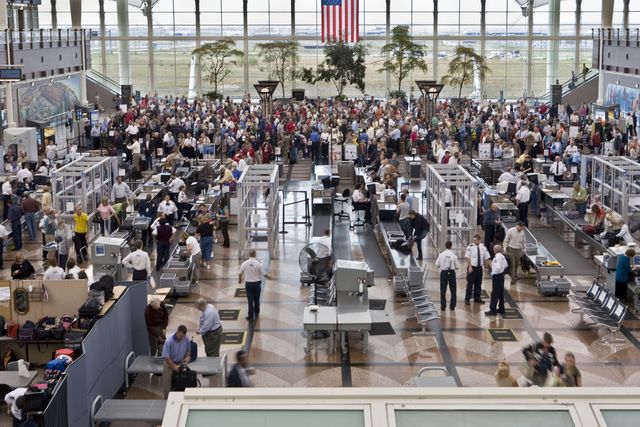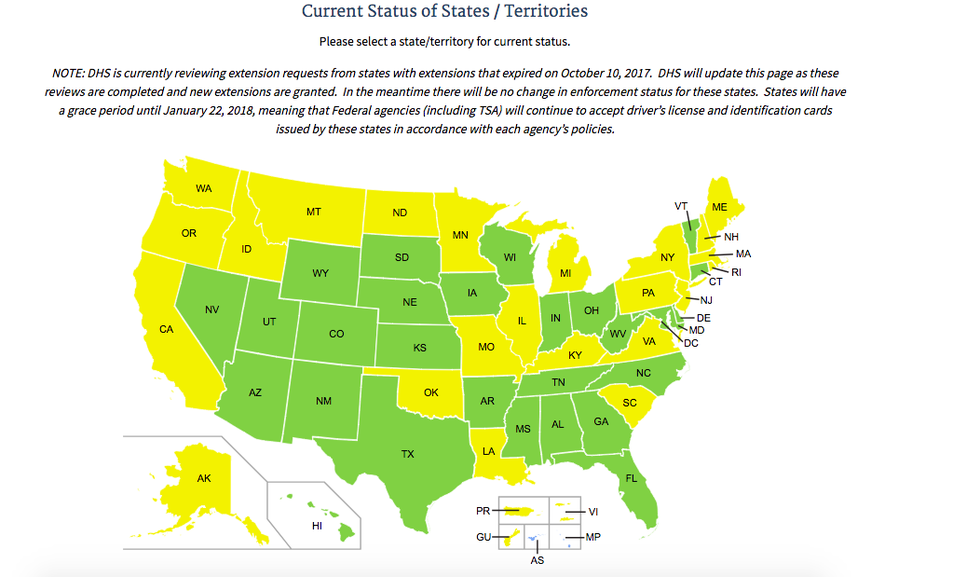In 2005, President George W. Bush signed the REAL ID Act into law. Attached to a military spending law, REAL ID mandated that state driver's licenses and ID cards follow federal technical standards and verification procedures issued by the Department of Homeland Security (DHS). Thirteen years later, the Trump Administration is finally trying to get full, nationwide compliance.
DHS is now saying that the following 23 states still operating under extensions, which delay their REAL ID mandate, have until October 10th to comply.
- Washington
- Oregon
- California
- Alaska
- Idaho
- Montana
- North Dakota
- Minnesota
- Oklahoma
- Missouri
- Louisiana
- Illinois
- Michigan
- Kentucky
- Virginia
- South Carolina
- Pennsylvania
- New York
- New Jersey
- Maine
- New Hampshire
- Massachussetts
- Rhode Island
Under the law, which has its origins in a 9/11 Commission recommendation, there is no single REAL ID: states issue their own documents but must now adhere to federal standards relating to card design and application processing.
In order to get the information needed to process those applications, REAL ID requires that states share information with the federal government—and that's where privacy groups have concerns.
"To be clear, we're not against counterfeiting," Marc Rotenberg, executive director of the Electronic Privacy Information Center (EPIC), told Popular Mechanics. "Efforts to improve security should be supported. Our objections are combining state and federal information." EPIC, and groups that share its concerns, claim that REAL ID would have been ineffective in stopping the 9/11 attacks since those attackers all used passports rather state IDs.
But the Trump administration's move is an expected one. Back when President Trump's chief of staff John Kelly was still head of DHS, he told Congress that REAL ID is "a critically important 9/11 Commission recommendation that others have been willing to ignore, but I will not. I will ensure it is implemented on schedule—with no extension—for states that are not taking it seriously."
Kelly's chief of staff at the time, Kirsten Nielsen, is the current DHS Secretary.
States who have not complied with the REAL ID have a variety of reasons for doing so. In Maine, for example, REAL ID has been met with skepticism for its consolidation of state and federal data as well as the potential cost to the state for its ID upgrades. State officials have said that it will be REAL ID compliant by July 2019, too late for the Trump Administration's deadline.
The history of REAL ID is one of delays, extensions, and conflicting deadlines, all underscoring the potential for the nightmare scenario of passengers showing up to airports and being refused for out-of-date IDs. Some opponents of the law fear that such strandings will happen to prove a point on enforcement.
"It might be easier to try that stunt in Minnesota," Ben Feist, legislative director for the ACLU in Minnesota, tells Bloomberg. "Are you really going to stop everyone with a California and New York license from boarding a plane?"
As it stands, there's another deadline a few years away. "Starting October 1, 2020, every air traveler will need a REAL ID-compliant license, or another acceptable form of identification, for domestic air travel," says the DHS website.
How many states will be fully compliant by that point is anyone's guess.
Source: Bloomberg
Follow Delish on Instagram.
Download the Delish app.














